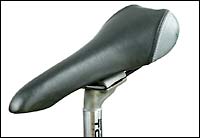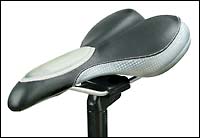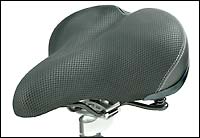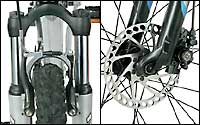
Above: A narrow-width seat

Above: A medium-width seat

Above: A medium-width seat
Seats and Saddles
The narrow, firm seats -- shown above -- found on certain mountain and road
bicycles allow one change position and pedal more efficiently and provide
more support. Bikes made for comfort and many hybrid varieties have wider,
softer seats, often with a suspension seat-post. If you try out a seat
and don't like it, get one with a different shape, more or less padding,
or channels or cutouts to ease pressure.
Brakes
Long-arm cantilever brakes (e.g., V-brakes or linear-pull brakes), road caliper brakes, and cross-cantilever brakes, are okay for most common uses. However, for rough, sloppy terrain, choose disc brakes, which will save your wheel rims from the wear and abrasion of muddy braking. Some bicycles are sold with your choice of brakes. Discs add about $100 or more. You may also retrofit some bikes with discs; ask at a bike mechanic about this option. Bikes with disc brakes can be purchased with linear-pull brakes, for $100 less.

Above: Linear-pull brakes (left); disc brakes (right)

High-rise handlebars

Low-rise handlebars

Flat handlebars
Handlebars
High-rise handlebars -- shown above left and found on comfort bikes, "leisure" bikes, hybrid bikes, and some mountain bikes -- allow one to sit fairly upright. Low-rise and flat handlebars -- used on mountain, hybrid and commuter bikes -- allow one to lean forward a bit. Road bikes use drop bars for an aerodynamic bent-over position. See which position feels best. Most handlebars can be raised or lowered, and adjustable-angle stems give more play. If you cannot get comfortable, try replacing the handlebars with a different type.

Twist-style shifter

Toggle/trigger-style shifter
Shifters
Twist shifters are collars on the handlebars that the rider physically twists in order to change gears. Toggle/trigger shifters have one lever for upshifting and one for downshifting, one pair each for the front and rear gears. Neither type is inherently better. Most are indexed, meaning they click as you shift, so one doesn't have to guess where the next gear is.
Toggle/trigger and twist shifters typically have an indicator to show what gear you are riding in. Road bike shifters usually lack this indicator (which may be available as a bike computer accessory for some systems), creating a bit of a challenge for someone new to road biking.
Road bikes use a different shifter design that works with a variety of hand positions available on drop handlebars. This shifter design is combined with the brake lever; you shift by pushing a lever inward (perpendicular to grasping a lever to brake). A different toggle or lever (depending on the design) is used to shift the other way.